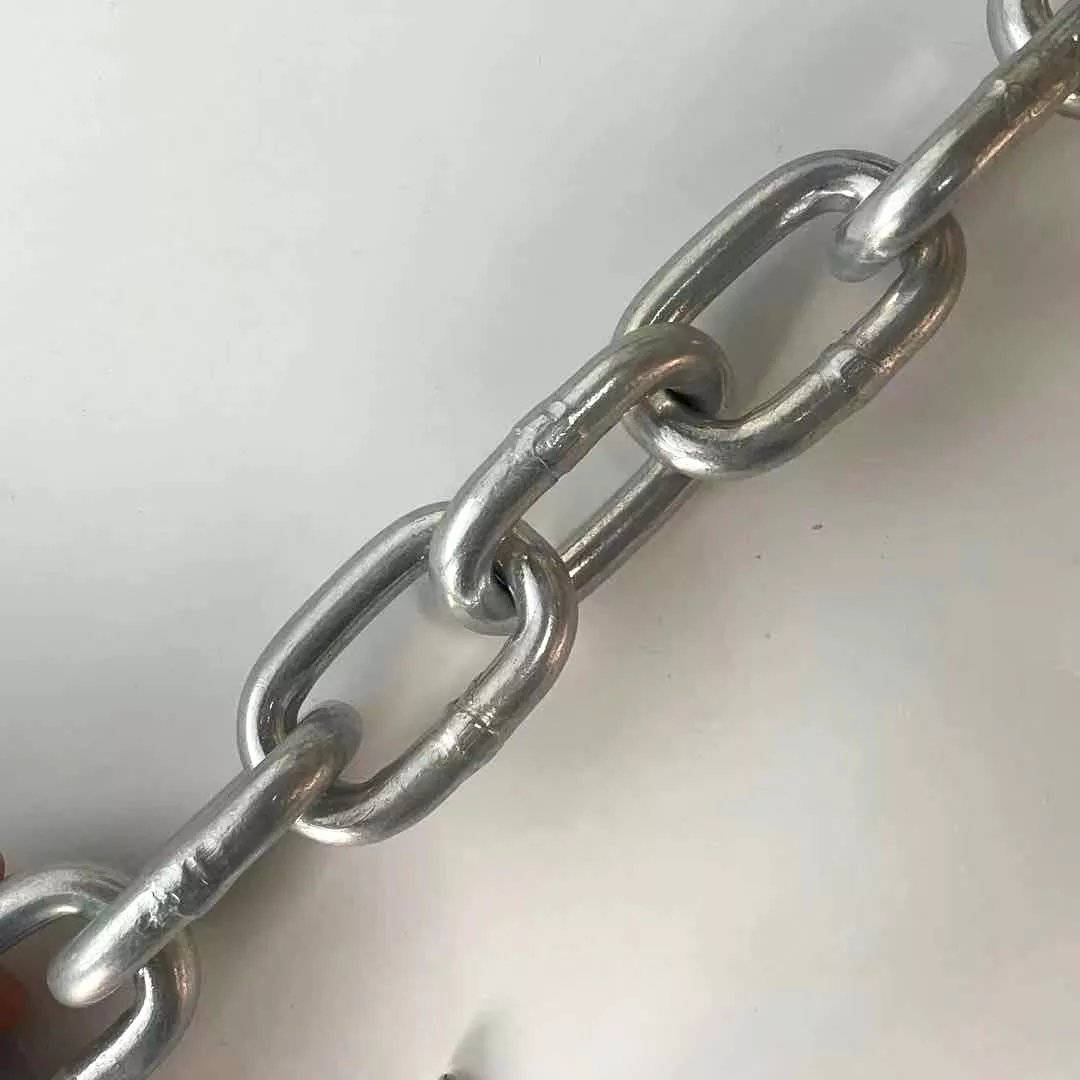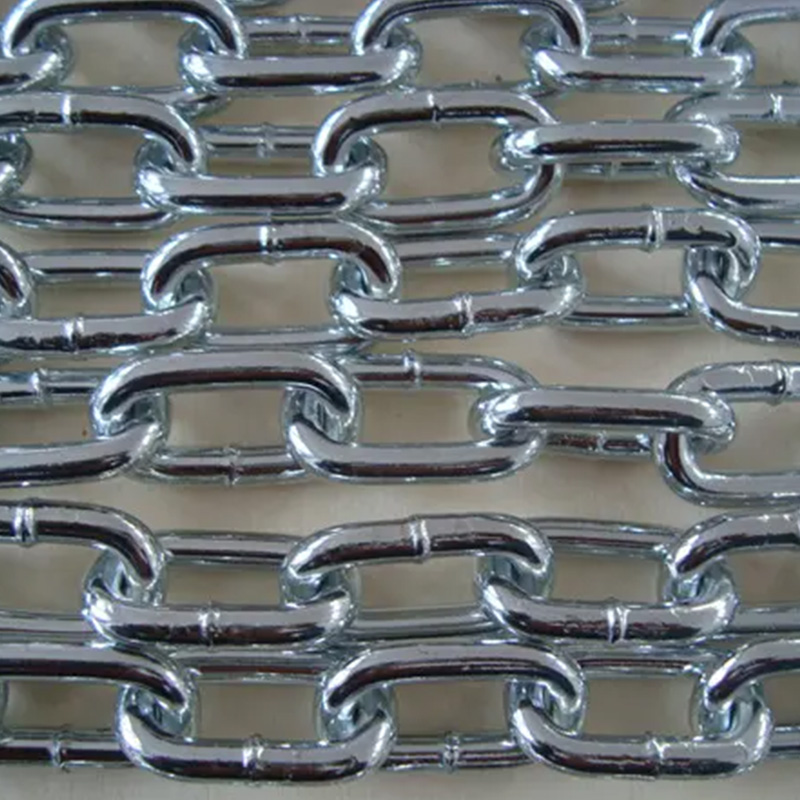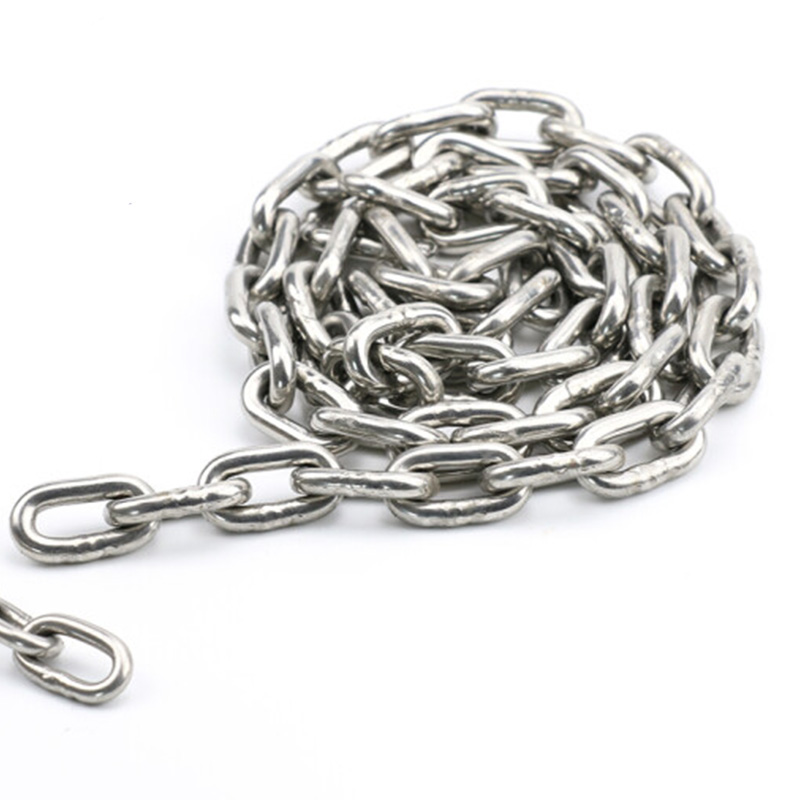Our staff will contact you within 12 hours, You can also contact us through the following ways:
Contact US WhatsApp: +8618766656705
- Email: [email protected]
- Tel: +8618766656705
- Web: https://www.toponechain.com/
When it comes to heavy-duty applications, having the right equipment is crucial for getting the job done safely and efficiently. DIN 764 chains are an excellent choice for a variety of heavy-duty applications, as they are designed to provide maximum strength and durability in even the most demanding environments.

DIN 764 chains are a type of calibrated chain that are made from high-grade alloy steel, making them incredibly strong and resistant to wear and tear. They are known for their exceptional resistance to deformation, making them a popular choice for heavy-duty lifting and rigging applications. Additionally, DIN 764 chains are designed to meet strict DIN standards, ensuring their quality and reliability.
One of the key benefits of DIN 764 chains is their ability to handle heavy loads. They are rated for a variety of weight limits, and can be used to lift and move heavy machinery, equipment, and other objects safely and securely. The chains are also designed to handle tough, abrasive environments, making them suitable for use in industries such as construction, manufacturing, and mining.
In addition to their strength, DIN 764 chains are also highly durable. They are designed to resist corrosion, which is an important feature for applications where the chains may be exposed to harsh environments, chemicals, or saltwater. The chains are also able to withstand extreme temperatures, making them suitable for use in a wide range of settings.
Proper maintenance and inspection are also key factors in ensuring the strength and durability of DIN 764 chains. It is important to inspect the chains regularly to ensure that they are free from damage, and to clean them after each use to prevent corrosion and other types of damage. Proper lubrication is also important to ensure smooth operation and to prevent wear and tear.
When it comes to selecting the right DIN 764 chain for your needs, it is important to choose a reputable supplier that can provide high-quality chains at a reasonable price. Look for suppliers that specialize in lifting and rigging equipment, and that have a strong reputation in the industry. Additionally, consider the weight limits and application requirements when selecting the appropriate DIN 764 chain for your needs.
In conclusion, DIN 764 chains are an excellent choice for heavy-duty applications, providing maximum strength and durability in even the most demanding environments. With proper maintenance and inspection, these chains can provide long-lasting performance and reliable operation, making them a valuable investment for any heavy-duty application.
Why are DIN 764 Chains durable?
DIN 764 chains are designed to be durable for several reasons. First and foremost, these chains are made from high-grade alloy steel, which is a type of steel that contains additional alloying elements such as manganese, chromium, and nickel. These elements improve the strength, toughness, and corrosion resistance of the steel, making it highly durable.
Additionally, DIN 764 chains are manufactured to meet strict DIN standards, which are widely recognized in the industry as a mark of quality and reliability. The DIN 764 standard specifies requirements for the design, manufacturing, testing, and inspection of calibrated chains, including DIN 764 chains. This ensures that the chains meet certain quality and performance standards and are suitable for their intended applications.
Another reason why DIN 764 chains are durable is because they are designed to resist deformation. Calibrated chains like DIN 764 chains are manufactured to very precise tolerances, ensuring that the links are uniform in size and shape. This helps to distribute the load evenly across the chain and prevent any one link from bearing too much weight. This reduces the risk of deformation, which can weaken the chain and reduce its overall durability.
Finally, DIN 764 chains are designed to resist corrosion, which is a major factor that can shorten the lifespan of chains in harsh environments. These chains are often coated with a protective layer, such as a zinc or black oxide coating, to prevent corrosion and other forms of damage. This helps to ensure that the chains remain strong and durable, even in challenging environments.
Overall, the combination of high-grade alloy steel, strict manufacturing standards, precise tolerances, and corrosion resistance make DIN 764 chains highly durable and well-suited for heavy-duty applications.
Why are DIN 764 Chains suitable for harsh environments?
DIN 764 chains are designed to be highly durable and resistant to various forms of wear and tear, which makes them well-suited for use in harsh environments. Here are some of the reasons why DIN 764 chains are ideal for such environments:
1. Corrosion resistance: One of the most common problems that can affect chains in harsh environments is corrosion. DIN 764 chains are typically made from high-grade alloy steel, which is highly resistant to corrosion. Additionally, they are often coated with a protective layer, such as zinc or black oxide, to further enhance their resistance to corrosion.
2. Strength and durability: DIN 764 chains are designed to be highly durable and able to withstand significant loads. They are manufactured to very precise tolerances, ensuring that the links are uniform in size and shape. This helps to distribute the load evenly across the chain and prevent any one link from bearing too much weight. This reduces the risk of deformation, which can weaken the chain and reduce its overall durability.
3. High temperature resistance: Many harsh environments involve exposure to high temperatures, which can cause conventional chains to weaken or deform. DIN 764 chains, on the other hand, are designed to withstand high temperatures and retain their strength and durability even under extreme heat.
4. Resistance to abrasion and impact: Chains used in harsh environments are often subjected to a lot of abrasion and impact, which can lead to wear and tear over time. DIN 764 chains are designed to be highly resistant to abrasion and impact, thanks to the use of high-grade alloy steel and precise manufacturing techniques.
5. Compliance with industry standards: DIN 764 chains are manufactured to strict DIN standards, which are widely recognized in the industry as a mark of quality and reliability. This ensures that the chains meet certain quality and performance standards and are suitable for their intended applications, including those in harsh environments.
Overall, DIN 764 chains are well-suited for harsh environments because of their corrosion resistance, strength and durability, high temperature resistance, resistance to abrasion and impact, and compliance with industry standards. These qualities make them a popular choice for heavy-duty applications in challenging environments.

Are there any specific application scenarios for DIN 764 Chains?
Yes, there are several specific application scenarios where DIN 764 chains are particularly well-suited. Here are a few examples:
1. Lifting and hoisting: DIN 764 chains are commonly used in lifting and hoisting applications, such as in cranes, forklifts, and other heavy machinery. Their strength and durability make them ideal for handling heavy loads, while their resistance to abrasion and impact ensures that they can withstand the rigors of regular use.
2. Marine and offshore environments: DIN 764 chains are also suitable for use in marine and offshore environments, where they are exposed to saltwater and other corrosive substances. The corrosion resistance of DIN 764 chains makes them an ideal choice for use in these applications, as they can withstand exposure to seawater and other harsh marine environments.
3. Mining and construction: DIN 764 chains are commonly used in mining and construction applications, where they are used to transport heavy materials and equipment. Their strength and durability make them well-suited for use in these applications, where they are often subjected to significant loads and stresses.
4. Agriculture: DIN 764 chains are also used in agriculture, particularly in the manufacturing of agricultural machinery and equipment. They are commonly used in hay balers, combine harvesters, and other equipment where they are exposed to the elements and subjected to regular use.
5. Transportation and logistics: DIN 764 chains are also used in transportation and logistics applications, such as in the manufacturing of trailers, container locks, and other equipment used to transport goods. Their strength and durability make them well-suited for handling heavy loads and withstanding the stresses of regular use.
Overall, DIN 764 chains are a versatile and durable choice for a wide range of heavy-duty applications in challenging environments. Whether it's in lifting and hoisting, marine and offshore environments, mining and construction, agriculture, or transportation and logistics, DIN 764 chains provide a reliable and long-lasting solution for a variety of industries.
Can you introduce in detail the application of DIN 764 Chains in mining and construction?
Certainly! DIN 764 chains are commonly used in mining and construction applications due to their high strength and durability. In these industries, they are typically used for the transportation of heavy materials and equipment, as well as for the operation of heavy machinery.
Here are a few specific examples of how DIN 764 chains are used in mining and construction:
1. Lifting and hoisting: DIN 764 chains are commonly used in lifting and hoisting applications, such as in cranes, forklifts, and other heavy machinery. Their strength and durability make them ideal for handling heavy loads, while their resistance to abrasion and impact ensures that they can withstand the rigors of regular use.
2. Marine and offshore environments: DIN 764 chains are also suitable for use in marine and offshore environments, where they are exposed to saltwater and other corrosive substances. The corrosion resistance of DIN 764 chains makes them an ideal choice for use in these applications, as they can withstand exposure to seawater and other harsh marine environments.
3. Mining and construction: DIN 764 chains are commonly used in mining and construction applications, where they are used to transport heavy materials and equipment. Their strength and durability make 4.them well-suited for use in these applications, where they are often subjected to significant loads and stresses.
5. Agriculture: DIN 764 chains are also used in agriculture, particularly in the manufacturing of agricultural machinery and equipment. They are commonly used in hay balers, combine harvesters, and other equipment where they are exposed to the elements and subjected to regular use.
6. Transportation and logistics: DIN 764 chains are also used in transportation and logistics applications, such as in the manufacturing of trailers, container locks, and other equipment used to transport goods. Their strength and durability make them well-suited for handling heavy loads and withstanding the stresses of regular use.
Overall, DIN 764 chains are a versatile and durable choice for a wide range of heavy-duty applications in challenging environments. Whether it's in lifting and hoisting, marine and offshore environments, mining and construction, agriculture, or transportation and logistics, DIN 764 chains provide a reliable and long-lasting solution for a variety of industries.

Can you introduce in detail the application of DIN 764 Chains in mining and construction?
Certainly! DIN 764 chains are commonly used in mining and construction applications due to their high strength and durability. In these industries, they are typically used for the transportation of heavy materials and equipment, as well as for the operation of heavy machinery.
Here are a few specific examples of how DIN 764 chains are used in mining and construction:
1. Conveyor systems: DIN 764 chains are often used in conveyor systems that are used to transport heavy materials, such as coal, ores, and other minerals. The chains are attached to a series of metal plates, or "pans," that move the materials along the conveyor line. DIN 764 chains are ideal for use in these applications because they can withstand the heavy loads and stresses of the conveyor system.
2. Mining equipment: In mining applications, DIN 764 chains are commonly used to operate heavy equipment, such as excavators and draglines. The chains are used to move the buckets or other attachments that are used to dig and transport materials. The strength and durability of DIN 764 chains make them well-suited for these applications, where they are subjected to significant stresses.
3. Construction machinery: DIN 764 chains are also used in the manufacturing of construction machinery, such as cranes, excavators, and bulldozers. In these applications, the chains are used to operate the various components of the machinery, such as the booms and buckets. DIN 764 chains are well-suited for these applications because they can withstand the heavy loads and stresses of the machinery.
4. Anchoring and support: DIN 764 chains are also used for anchoring and support in mining and construction applications. They can be used to secure heavy equipment or structures to the ground, or to provide support for underground tunnels and mines.
Overall, DIN 764 chains are a reliable and durable choice for a wide range of mining and construction applications. They provide the strength and durability needed to handle heavy loads and withstand the stresses of these challenging environments.
Can you list products with the same or similar standards as DIN 764 chains?
Yes, there are several other chains that are similar to DIN 764 chains in terms of their construction, strength, and durability. Some of the most common ones include:
1. DIN 766 chain: This is a higher strength version of DIN 764 chain, and is often used in marine applications.
2.Grade 80 chain: This is a high-strength alloy steel chain that is commonly used in lifting and rigging applications.
3. Grade 100 chain: This is an even higher-strength version of Grade 80 chain, and is often used in heavy-duty lifting and rigging applications.
4. NACM 84/90 chain: This is a general-purpose chain that is commonly used in a variety of industries, including agriculture, construction, and manufacturing.
5. NACM 96/98 chain: This is a higher-strength version of NACM 84/90 chain, and is often used in heavy-duty applications.
6. Australian Standard chain: This is a chain that is commonly used in Australia, and is similar in strength and construction to DIN 764 chain.
When selecting a chain for a specific application, it is important to consider the load requirements, environmental factors, and other application-specific factors to ensure that the chain is appropriate for the task at hand. It is also important to choose a reputable manufacturer and ensure that the chain meets industry standards and regulations.